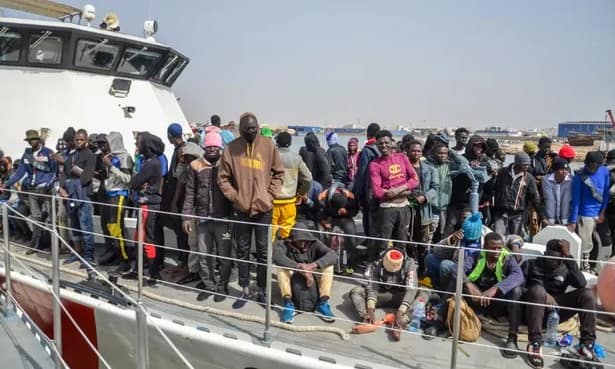Ursula von der Leyen says €900m will be macrofinancial assistance while €105m will help combat people-smuggling
The European Union is considering providing more than €1bn (£850m) in aid for Tunisia to rescue state finances and deal with a migration crisis, the EU Commission president Ursula von der Leyen said on Sunday.
Speaking in Tunisia, Von der Leyen said €900m would be macrofinancial assistance while an immediate €150m would support a reform agenda set by the International Monetary Fund.
She said this could be ready “as soon as the necessary agreement is found”, without elaborating.
As part of the €1bn package, a further €105m will be funnelled into a new partnership with Tunisia to combat people-smuggling, human trafficking and the continuing tragedies at sea.
The EU chief was visiting Tunisia along with the Italian and Dutch prime ministers, Giorgia Meloni and Mark Rutte, who are keen to strike a partnership deal with the north African country to stem migration and people-smuggling to Europe.
It is the second time in a week that Meloni has visited the country.
The EU, like other major donors to Tunisia, has so far conditioned its support on the country finalising a loan programme with the IMF, but President Kais Saied has rejected key reforms required by that plan.
He also pushed back on Saturday at a Turkey-style refugee partnership, saying the country would not act as Europe’s border guard.
The EU is concerned that if the economic crisis in Tunisia deepens, Europe will face an even bigger increase of irregular migrants trying to cross the Mediterranean this summer.
Saied has said cuts to subsidies and restructuring of state-owned companies, which his own government proposed to the IMF to reassure lenders they would be repaid, risked igniting a social explosion. Any new agreement based on different proposed reforms could take months more to negotiate.
Meloni has pressed for the IMF to relax conditions for the loan. She said on Sunday the EU and Tunisia had already signed a joint declaration, which she hailed as an important step “towards the creation of a real partnership”.
She said there was “an important window of opportunity” to finalise the aid agreement before the European Council at the end of June. It was not clear if Tunisia would still need to finalise its IMF programme to qualify.
On Sunday the EU laid out details of a partnership programme that would strengthen economic and trade ties with Tunisia, including a comprehensive air transport agreement that could help tourism and a €150m “Medusa” digital cable link to Europe which it said could support research and education in the country.
It also signed a memorandum of understanding on renewable energy.
Von der Leyen said the EU would also expand opportunities for young Tunisians to study, work and train in the EU to help them develop skills that could be used to boost the Tunisian economy.
The Tunisian pact comes just three days after EU member states agreed radical reforms to its proposed migration laws allowing Italy to deport economic migrants to countries such as Tunisia if a deal with the country enabled such returns.
